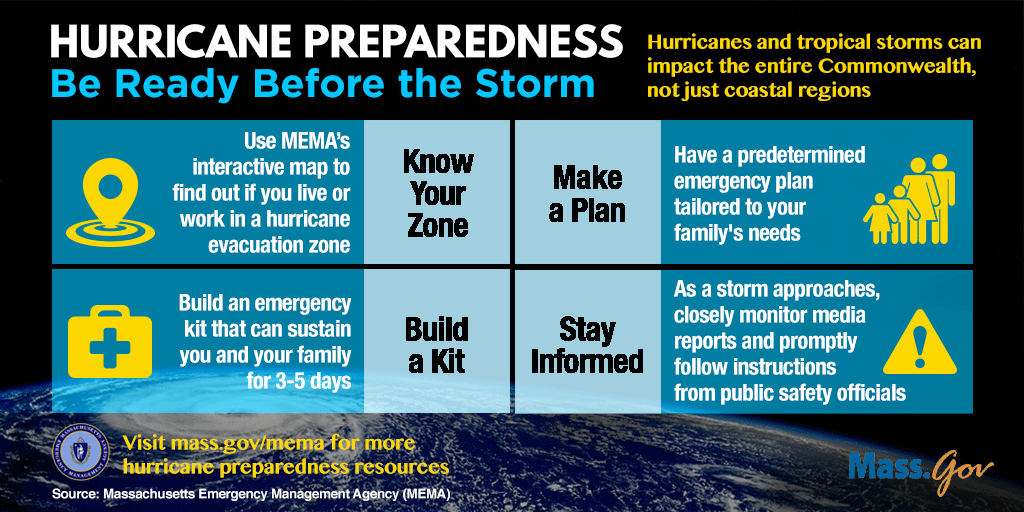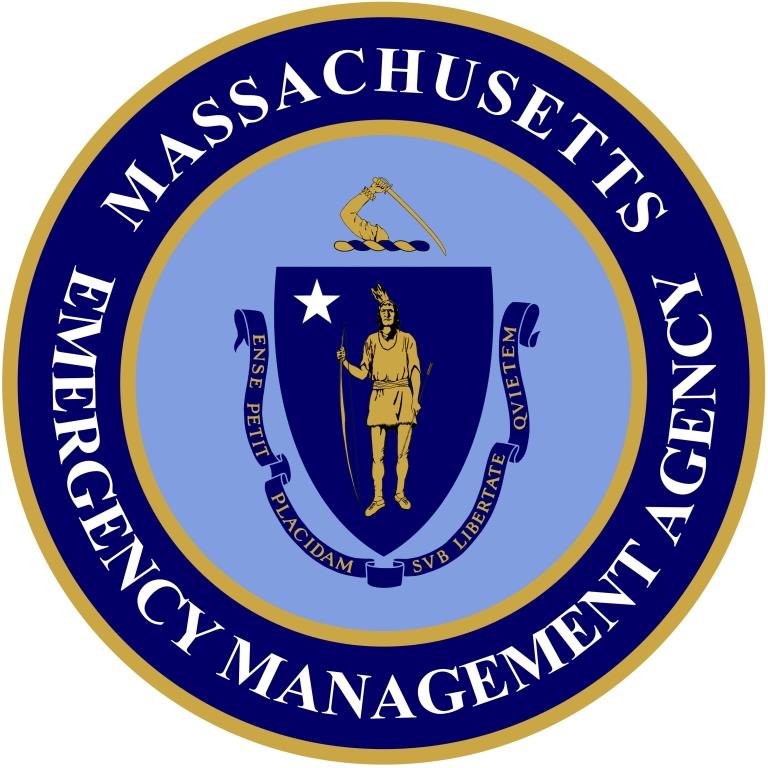- Massachusetts Emergency Management Agency
Media Contact
Christopher Besse, Massachusetts Emergency Management Agency

FRAMINGHAM — This week marks the official start of the Atlantic Hurricane Season which runs through November 30th. While the majority of tropical storms and hurricanes that have impacted New England occurred during the months of August and September, now is the time to begin preparing yourself, your family, your home, and your business. Throughout hurricane season, the Massachusetts Emergency Management Agency (MEMA) will share preparedness information to help residents be aware of, and prepare for, the impacts of tropical storms and hurricanes.
While continuing to respond to the coronavirus (COVID-19) pandemic, the Massachusetts Emergency Management Agency remains committed to ensuring the Commonwealth is prepared for other disasters including hurricanes and tropical storms. As hurricane season begins, MEMA is actively planning for how to respond to disasters while considering the public health challenges of COVID-19.
The National Oceanic and Atmospheric Administration (NOAA) seasonal outlook predicts an above normal number of hurricanes this season. Regardless of the seasonal forecast, it only takes one storm to make landfall and severely impact an area. Tropical Storm Irene, which produced devastating flooding in Central and Western Massachusetts in 2011, is a reminder that hurricanes and tropical storms can impact many areas of the Commonwealth, not just coastal regions, and that all Massachusetts residents need to prepare for the possibility of hurricane impacts. To learn more about the hazards associated with hurricanes and tropical storms, visit MEMA’s hurricane webpage: www.mass.gov/mema/hurricanes.
“The coronavirus public health emergency won’t stop the threat of hurricanes, and in many ways makes responding to other disaster even more challenging. We have adjusted our planning to ensure that we are prepared and want residents to be prepared, as well,” said MEMA Director Samantha Phillips. “The beginning of hurricane season is a great opportunity for all residents of the Commonwealth to learn if they live in a hurricane evacuation zone, make an emergency plan, assemble an emergency kit, and stay informed. This is especially true for the 2020 hurricane season as we continue to manage the complexity of COVID-19.”
MEMA Hurricane Season Preparedness Activities
MEMA is working closely with the Department of Public Health and the newly established Pandemic Disaster Mass Care Working Group to develop guidance for evacuations and mass care during COVID-19. This guidance will be provided to municipalities to inform their planning and preparedness for hurricane season and will be used to adjust the Commonwealth’s mass care and evacuation plans to help keep individuals both safe and healthy during a disaster.
Working in partnership with the Emergency Support Function Team and with local partners some of the steps MEMA is taking to prepare for the 2020 hurricane season during COVID-19 include re-evaluating capacities of state-initiated regional shelter sites; preparing for the need for additional evacuation transportation vehicles; adding screening, sanitization, disinfection, and general public health protocols to existing mass care plans; and planning for and preparing to provide sheltering in non-congregate settings such as hotels.
Know Your Evacuation Zone
Massachusetts has defined hurricane evacuation zones, designated as Zone A, Zone B and Zone C, for areas of the state at risk for storm surge flooding associated with tropical storms or hurricanes. If evacuations are necessary because of a tropical storm or hurricane, local or state officials will notify people living, working, or vacationing in evacuation zones to leave the area for their safety. Even areas not directly along a coastline may be at risk for storm surge flooding during a tropical storm or hurricane. Find out if you live, work, or vacation in a hurricane evacuation zone by visiting the ‘Know Your Zone’ interactive map located on MEMA’s website at www.mass.gov/knowyourzone.
Make an Emergency Plan
Develop a plan with the members of your household to prepare for what to do, how to find each other, and how to communicate in a tropical storm or hurricane. An emergency plan should include:
- Meeting Locations
- Emergency Contact Information
- Evacuation Plans
- Shelter-in-Place Plans
- Considerations for Family Members with Access and Functional Needs, and Pets
For more information, see: https://www.mass.gov/info-details/make-a-family-emergency-plan.
Build an Emergency Kit
Build an emergency kit containing items that will sustain you and your family in the event you are isolated for three to five days without power or unable to go to a store. Emergency kits are particularly important during hurricane season, due to potential extended power outages, flooding, and impassable debris-covered roads. While it is important to customize your kit to meet the unique needs of you and your family, every emergency kit should include bottled water, food, a flashlight, a radio and extra batteries, a first aid kit, sanitation items, and clothing. Depending on your family’s needs, emergency kits should also include medications, extra eyeglasses, medical equipment and supplies, children’s items such as diapers and formula, food and supplies for pets and service animals, and other items you or your family members might need during a disaster. For a complete emergency kit checklist, visit: https://www.mass.gov/info-details/build-an-emergency-kit.
Stay Informed
Receiving advance warnings and timely emergency alerts and information from public officials is critical to staying safe during a tropical storm or hurricane. Every family should have multiple methods for receiving emergency alerts. Learn more about different types of alerting and information tools including the Emergency Alert System, Wireless Emergency Alerts, NOAA Weather Radio, Social Media & Traditional Media, 2-1-1 Hotline, Local Notification Systems: https://www.mass.gov/info-details/be-informed-and-receive-emergency-alerts.
About MEMA
MEMA is the state agency charged with ensuring the state is prepared to withstand, respond to, and recover from all types of emergencies and disasters, including natural hazards, accidents, deliberate attacks, and technological and infrastructure failures. MEMA's staff of professional planners, communications specialists and operations and support personnel is committed to an all hazards approach to emergency management. By building and sustaining effective partnerships with federal, state and local government agencies, and with the private sector - individuals, families, non-profits and businesses - MEMA ensures the Commonwealth's ability to rapidly recover from large and small disasters by assessing and mitigating threats and hazards, enhancing preparedness, ensuring effective response, and strengthening our capacity to rebuild and recover. For additional information about MEMA and Emergency Preparedness, go to www.mass.gov/mema.
Continue to follow MEMA updates on Twitter at www.twitter.com/MassEMA; Facebook at www.facebook.com/MassachusettsEMA; YouTube at www.youtube.com/MassachusettsEMA.
###
